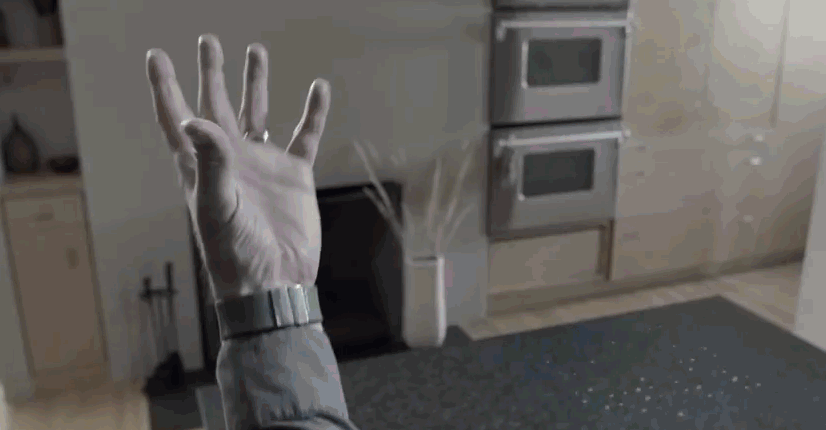 - In 2016, the digital world will come out to play.
- In 2016, the digital world will come out to play.
Our cellphones are about to turn inside out, scattering digital content out into the physical world. We're on the brink of a new era, where virtual reality will let us dive into the content, and augmented reality will hurl the content out into our surroundings.
Companies like Magicleap and Microsoft are counting down the days until they release the most revolutionary technology of the 21st century.
I've always worried about my thumbs -- these phones must be giving everyone arthritis. But arthritic hands may no longer be an inevitable byproduct of ergonomically incorrect technology. Constantly tapping, swiping, and navigating our devices has placed a heavy burden on our opposable thumbs. Luckily, Google and Microsoft have been working their magic, and they may have just found the cure.
We live in a time of endless novelty, and rapidly changing cultures and movements. Both socially and technologically, humanity is evolving increasingly fast. When our grandparents were first introduced to TV and radio, it was another 40 years before any revolutionary pieces of technology came along. We, however, have been privileged enough to witness the revolution of the internet era. Ten years ago, in a grade nine English class, was the first time I had heard of an Ipod. In fact, before that time in 2004, I hadn't even heard of Apple. Since then, the advances in personal and industrial electronics have blown the world's collective mind. Some of us choose to fear the future.
Some of us choose to fear the future.With so many unknowable variables, it's hard to be optimistic in a cloud of uncertainty. But in a world where science fiction is quickly becoming reality, we have much to look forward to. Provided the world doesn't end in a nuclear holocaust, artificial intelligence does not want to kill us, and global warming is brought under control, the future seems to be an exciting place full of growth and potential.
We live in a time of endless novelty, and rapidly changing cultures and movements. Both socially and technologically, humanity is evolving increasingly fast. When our grandparents were first introduced to TV and radio, it was another 40 years before any revolutionary pieces of technology came along. We, however, have been privileged enough to witness the revolution of the internet era. Ten years ago, in a grade nine English class, was the first time I had heard of an Ipod. In fact, before that time in 2004, I hadn't even heard of Apple. Since then, the advances in personal and industrial electronics have blown the world's collective mind. Some of us choose to fear the future.
Some of us choose to fear the future.With so many unknowable variables, it's hard to be optimistic in a cloud of uncertainty. But in a world where science fiction is quickly becoming reality, we have much to look forward to. Provided the world doesn't end in a nuclear holocaust, artificial intelligence does not want to kill us, and global warming is brought under control, the future seems to be an exciting place full of growth and potential.
Today's smartphone is a modern marvel of humanities technological advancement, but we are nowhere near complete. The small rectangular slabs of glass in our pockets have gotten faster, lighter, thinner, and far more powerful than when they were introduced less than one decade ago. In that time, we've been using this exponentially growing technology to develop even further. Technology has been expanding in a self-amplifying feedback loop of progress. One piece of tech emerging from this accumulation of progress is called augmented reality. Within the coming 12 months, these marvels of modern engineering will be entering the global market.
Augmented reality is the next revolution in connected devices. It is hard to do justice to the experience through the written word... so I highly suggest watching the two videos posted below.
This is the first promotional video for Microsoft's Hololens. The commercial showcases the business and personal applications of holographic technology. It shows living rooms coming to life, and industrial designs manifesting themselves onto office desktops.
This second video is a promotion for Magic Leap, a highly secretive company that Google recently invested $500 million into. Their promotional video starts with a floating G-mail feed, showing the practical e-mail and social applications. The scene quickly escalates when a gaming application is loaded, and augmented robots break through the walls. An action packed battle ensues, taking over Magic Leap's office space.
The future will be made of holograms, visible only to the wearers of these headsets. Our artificially intelligent helpers may be holographic personifications of Apple's Siri or Microsoft's Cortana. Our video games will be projected into our living rooms and offices. Product manufacturers will be able to manifest their 3D designs into their work environments, and manipulate their creations. Our videos will be played on floating screens that can be adjusted to hundreds of inches in width, or simply float in front of our eyes. We will likely have the choice between our 'old fashioned' smartphones, or the new augmented operating systems. To merge or not to merge -- that will be the question.

No comments:
Post a Comment